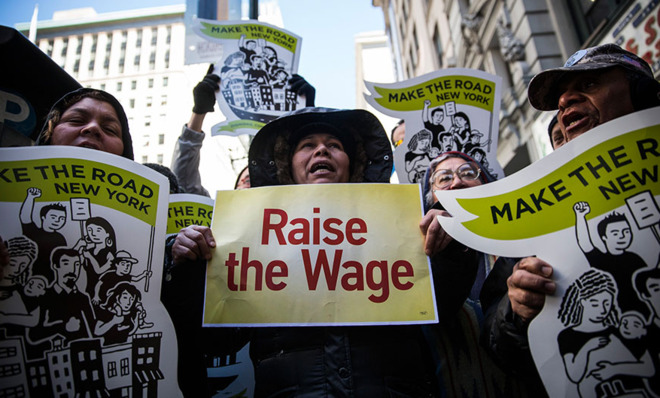The great wage slowdown
Everything you need to know, in four paragraphs

A free daily email with the biggest news stories of the day – and the best features from TheWeek.com
You are now subscribed
Your newsletter sign-up was successful
The labor market may finally be hitting its stride, said Eric Morath at The Wall Street Journal. October marked the 49th straight month of U.S. job growth, the "longest stretch of job creation since at least World War II." Employers added 214,000 new jobs to their payrolls, and August and September's jobs numbers were revised up, pushing the unemployment rate down to 5.8 percent, "closer to a level many economists consider healthy." The size of the labor force grew as well, said Matt O'Brien at The Washington Post, "which means that unemployment fell for the good reason that people were finding work, and not the bad one that they were giving up." Five years on, the recovery appears to be "ever-so-slightly speeding up."
Too bad most Americans can't feel it, said The New York Times in an editorial. Since 2009, "the economy has grown by 12 percent, corporate profits by 46 percent, and the broad stock market by 92 percent." But median household income has actually contracted 3 percent. Job gains simply haven't translated into higher pay; 65 percent of the private-sector jobs created in the last five years have paid hourly wages of $20 or less. Last month was no different, with job growth concentrated in low-wage sectors like restaurants, retail, and temporary work. Americans might take home a little more dough now and then by working more hours or saving money on falling gas prices, "but they are not getting ahead in any real sense." The economy is doing better on paper, but it's still "not working for those who rely on paychecks to make a living."
Bosses don't feel the need to offer raises because they aren't struggling to find workers to fill available jobs, said Allison Schrager at Bloomberg Businessweek. Millions of people who have been unemployed for many months or who are "working in part-time or low-paying jobs because they can't find anything else" stand at the ready to replace workers, and "pay won't increase" until this so-called slack in the labor market is absorbed. It's hard to predict when that will happen, but unemployment will probably have to fall a good deal more before it does. In truth, not all workers are losing, said Derek Thompson at The Atlantic. Mining and energy jobs, for instance, "have had a fantastic few years, while retail and food service wage growth has been awful." The problem is that we're adding lots of jobs in industries with stagnant wages, and very few jobs in those with rising pay.
The Week
Escape your echo chamber. Get the facts behind the news, plus analysis from multiple perspectives.

Sign up for The Week's Free Newsletters
From our morning news briefing to a weekly Good News Newsletter, get the best of The Week delivered directly to your inbox.
From our morning news briefing to a weekly Good News Newsletter, get the best of The Week delivered directly to your inbox.
In the run-up to the 2016 presidential election, "the central question will be how both parties respond to the great wage slowdown," said David Leonhardt at The New York Times. In the meantime, "Washington could definitely do more to help [economic] growth: better infrastructure, a less burdensome tax code, a less wasteful health-care system." Yet no mix of these policies is likely to end wage stagnation "anytime soon." A more immediate fix would be a middle-class tax cut. That wouldn't be a cure-all, and might even temporarily worsen some of the country's economic problems. But after years of disappointing pay, many voters are eager for a simple solution "that can help people immediately."
A free daily email with the biggest news stories of the day – and the best features from TheWeek.com
Sergio Hernandez is business editor of The Week's print edition. He has previously worked for The Daily, ProPublica, the Village Voice, and Gawker.
-
 Labor secretary’s husband barred amid assault probe
Labor secretary’s husband barred amid assault probeSpeed Read Shawn DeRemer, the husband of Labor Secretary Lori Chavez-DeRemer, has been accused of sexual assault
-
 Trump touts pledges at 1st Board of Peace meeting
Trump touts pledges at 1st Board of Peace meetingSpeed Read At the inaugural meeting, the president announced nine countries have agreed to pledge a combined $7 billion for a Gaza relief package
-
 Britain’s ex-Prince Andrew arrested over Epstein ties
Britain’s ex-Prince Andrew arrested over Epstein tiesSpeed Read The younger brother of King Charles III has not yet been charged